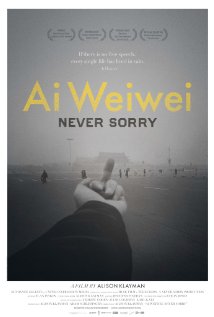Ai Weiwei: Never Sorry. Directed by Alison Klayman. 2012. (Documentary, 96 min.)
 Ai Weiwei: Never Sorry tells the story of Ai Wei Wei, perhaps the most famous Chinese artist on the international art scene today, and his fight against the Chinese government. Director Alison Klayman uses interviews to weave together the stories of Ai the artist and Ai the activist into a critically-acclaimed debut documentary film. As Klayman follows Ai around China and abroad, it becomes clear that that the two aspects of Ai are inseparable.
Ai Weiwei: Never Sorry tells the story of Ai Wei Wei, perhaps the most famous Chinese artist on the international art scene today, and his fight against the Chinese government. Director Alison Klayman uses interviews to weave together the stories of Ai the artist and Ai the activist into a critically-acclaimed debut documentary film. As Klayman follows Ai around China and abroad, it becomes clear that that the two aspects of Ai are inseparable.
One of Ai’s art/activism projects that demonstrates this is “Citizens’ Investigation.” By collecting information and publicizing it in the immediate aftermath of the 2008 Sichuan Earthquake, Ai and his team of volunteers do the work that they feel the government should be doing—but isn’t. Klayman avoids making any direct political commentary, yet she unabashedly depicts Ai’s struggle with free speech against a government that comes off as anything but transparent.
Featuring “Citizens’ Investigation” provides insight into the artist’s way of thinking and working, as well as his ability to connect with people. For example, Ai uses social media like Twitter and blogging to make his personal struggles with the government—a physical assault, the razing of his house—instantly global. Ai appears determined to make his voice heard all over the world, which makes his sudden disappearance and resulting silence, halfway through the film, particularly poignant.
Ai is eventually released by the government, whereupon he continues his activism. At this point Klayman shows us Ai’s translation of information about the disaster into artworks celebrated by the Western art world. Among the works featured is an installation of backpacks (symbolizing the thousands of children who died in the disaster in school collapses, blamed on allegedly poor building construction), called “Remembering,” in the 2009 show So Sorry. This work is just one example of how Ai’s political acts become his art and vice versa.
Ai is an important cultural and political figure of our time. Thus, this documentary is recommended to all, and especially to those who wish to learn more about the 2008 Sichuan Earthquake and Ai’s frustration with the Chinese government’s handling of the disaster.
Ashanti Shih, Yale University
![[Teach311 + COVID-19] Collective](https://blogs.ntu.edu.sg/teach311/files/2020/04/Banner.jpg)